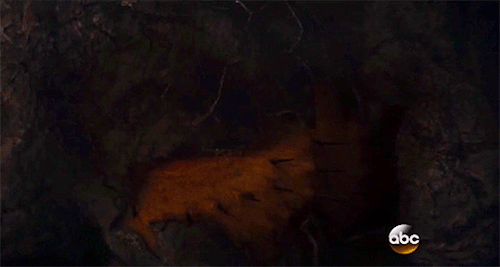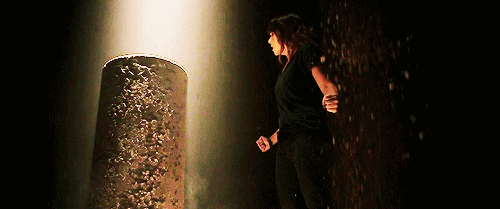
“AGENTS OF S.H.I.E.L.D.” AND THE DISAPPOINTMENT OF SEASON TWO (2014-2015)
I might as well put my cards on the table. I did not like Season Two of “AGENTS OF S.H.I.E.L.D.”. In fact, I almost despised it. But what I despised even further is this belief among television viewers and critics that Season Two was an improvement over the series’ first season. This told me that today’s society has no real concept of what constitutes good or bad storytelling.
After the Season One finale, (1.22) “Beginning of the End”, first aired, I made a prediction that the producers and writers would respond to the complaints about the show’s slow storytelling and give them what they want in the following season. When I first saw the Season Two premiere, (2.01) “Shadows”, I saw to my disappointment that Joss Whedon’s Mutant Enemy, Marvel and Disney did exactly that. “Shadows” was a travesty for me. But the worst was yet to come. By the time the series’ mid-season finale (2.10) “What They Become” had aired, I was ready to throw in the towel for this series. So, what kept me watching “AGENTS OF S.H.I.E.L.D.” after that horrible mid-season episode? My family. By this time, the members of my family had become regular viewers of the show. However, I did my level best to ignore as many episodes as I could. Unfortunately, I was unable to ignore most of the episodes that made up the second half of the show.
Where there any aspects of Season Two of “AGENTS OF S.H.I.E.L.D.” that I liked? There were some performances that impressed me. Both Reed Diamond and Dichen Lachman made first-rate villains as former HYDRA commander Werner Reinhardt aka Daniel Whitehall and the Inhumans’ leader Jiaying. I suppose I have to give some credit to Mutant Enemy and Marvel/Disney for promoting Henry Simmons (Alphonso “Mack” MacKenzie) to series regular, despite getting rid of B.J. Britt (Antoine Triplett) and maintaining J. August Richards (Mike Peterson aka Deathlok) as a recurring cast member. This show’s attitude toward non-white characters and performers is still bad enough to make my stomach turn. And there are at least four episodes that I managed to really enjoy this season, namely:
(2.04) “Face My Enemy” – Agent Melinda May is kidnapped and a HYDRA impersonator takes her place in order in order to lure S.H.I.E.L.D. Director Phil Coulson into a trap. This episode first introduced the brainwashed Kara Palamas aka Agent 33.
(2.15) “One Door Closes” – This episode featured flashbacks on how agents like Alfonso MacKenzie, Bobbi Morse and especially Robert Rodriguez survived the fall of S.H.I.E.L.D., while serving aboard one of the agencies’ aircraft carriers and formed their own S.H.I.E.L.D. faction.
(2.17) “Melinda” – Once again, Agent May is the focus. In this episode, she looks into Coulson’s actions as S.H.I.E.L.D. director, while in control of the agency’s main base. This episode also flashed back to how her first encounter with the Inhumans led to a great deal of trauma for her.
(2.21-2.22) “S.O.S.” -The two S.H.I.E.L.D. teams, now under Coulson’s leadership, try to prevent Jiaying from destroying the agency and mankind. Meanwhile, Bobbi Morse is held hostage by Grant Ward and Kara Palamas in order to coerce her into confessing her actions as a S.H.I.E.L.D. mole within HYDRA.
It is a miracle that I actually managed to enjoy three of this season’s twenty-two episodes without being disgusted, bored or pissed off. Why? Because there is a good deal of Season Two that I heartily disliked. One, I disliked the change in the series’ storytelling. I disliked how Joss Whedon, Jed Whedon, Maurissa Tancharoen seemed more interested in providing as much action as possible, without any real consideration toward the series’ narrative. There have been complaints about the series’ convoluted writing for the past season. But most fans and critics have not been listening or paying attention. Even the season finale, “S.O.S.” reflected this penchant to stuff as much action as possible. I found it unnecessary for the writers to include two major story arcs in this episode. They could have saved the Bobbi Morse kidnapping arc for a separate episode.
And then there was (2.19) “The Dirty Half Dozen”, the series’ tie-in to the summer blockbuster, “THE AVENGERS: AGE OF ULTRON”. The writers took a break from the Inhumans story arc to bring back HYDRA and do . . . what? Coulson, his team, Robert Gonzales’ S.H.I.E.L.D. team, Grant Ward and Kara Palamas infiltrated a HYDRA base operated by one Dr. List to save Mike Peterson aka Deathlok and Inhuman Lincoln Campbell, who had been kidnapped by the villainous agency. This gave Coulson the opportunity to discover the location of the main HYDRA base and the organization’s leader, Wolfgang von Strucker. This whole episode was about setting up the prologue for the second “THE AVENGERS movie and trying to repeat the critical success of Season One’s (1.17) “Turn, Turn, Turn”. As far as I am concerned, the Season Two episode failed. Why? The Season One episode had a far reaching impact on both the season and series’ narrative. “The Dirty Half Dozen” barely made an impact on the rest of the season, other than driving Ward and Kara away from S.H.I.E.L.D. And the season’s main narrative immediately returned to the Inhuman story arc. I have never known for Mutant Enemy to be this clumsy in their writing in the past.
Another aspect of Season Two that I disliked so much was the unwillingness of the showrunners to take their time with their stories. “AGENTS OF S.H.I.E.L.D.” is supposed to be at its core, a serial drama. The story lines for serial dramas are supposed to take its time … even to the point of them being played out over several seasons. Due to some need for higher ratings and pleasing the fans who seemed to be unaware of what a serial drama is supposed to be, the Whedons and Tancharoen rushed headlong into Season Two’s story arc without bothering to set up the introductions of the new characters. Well, I take that back. They took their time with the Daniel Whitehall and Jiaying characters. But they rushed headlong into the introductions of Lance Hunter, Alphonso MacKenzie and Bobbi Morse without any real setup. Why? They wanted to rush right into the action. Storytelling has now reached a point in which novels, movies and serial television series have to jump into the action without any real set up or introduction. Why? Because so many people have become so damn impatient. Or else today’s society has the attention span of a gnat.
Mutant Enemy also did a piss-poor job of handling some of their characters. For example . . . there is Grant Ward. Why is this character still on the show? Why is he still a regular? He was in slightly more than half of the episodes, this season. In fact, he was missing a lot in the second half of Season Two. He has become a irrelevant character. Mutant Enemy should have wasted his ass at the end of Season One. Most of Season Two saw Brett Dalton portray Ward as some mysterious super spy, while channeling Julian McMahon’s acting style. It did not help that producer Jeffrey Bell tried to claim that Dalton possessed the same level of acting skills and screen presence as James Marsters of “BUFFY THE VAMPIRE SLAYER”. I did not know whether to laugh at the implication or shake my head in disgust. Worse, I was subjected to three episodes of the saga regarding Ward’s relationship with his brother, Senator Christian Ward (Tim DeKay). The entire story arc came to nothing and no future impact upon the series’ narrative. Ward ended the season with accidentally killing Kara and declaring his intentions of becoming the new HYDRA leader. All I can say is . . . good luck. Why? Recently, Marvel and Disney announced that Daniel Brühl had recently been cast to portray Baron Zemo, the new HYDRA leader for the upcoming film, “CAPTAIN AMERICA: CIVIL WAR”. If so . . . why is Ward still around?
Another problematic character for me proved to be Skye aka Daisy Johnson aka Earthquake (or whatever her name is). I used like Skye . . . back in Season One. I did not like her very much in Season Two. Her story arc dominated the season just a little too much. She also lost some of her sense of humor. Her martial arts skills developed just a bit too fast for me to consider them realistic. And quite honestly, I realized I could not care less about the Inhuman story line. Or the fact that Skye became a “super being”. I am still pissed that Mutant Enemy allowed Skye to become one without any change in her physical looks. Yet, it was so damn important that another character, Raina, have her looks drastically altered. I guess that is what happens when an actress of African descent appears on this show.
Then again, this series’ treatment of its non-white characters, especially African-Americans, has always been problematic . . . even in Season One. It grew worse in Season Two. At least two non-white male characters – Antoine “Tripp” Triplett and the other S.H.I.E.L.D. director Robert Gonzales – were bumped off. I am still angry over Trip’s death. And I am disgusted over the handling of Gonzales character. I cannot count the number of episodes in which Coulson maintained this smug and superior attitude toward Gonzales, which left me feeling disgusted. The manner of his death also disgusted me. But I was not surprised. Mutant Enemy also managed to kill off three non-white female characters in “S.O.S.” – Jiaying, Raina and Kara Palamas. Three non-white women . . . in one episode. What in the fuck?? Disney/Marvel and Mutant Enemy did make Henry Simmons a series regular at the end of the season. Yet, they did so at least sometime after they had promoted Adrianne Palicki. They also promoted Luke Mitchell, who portrays Inhuman Lincoln Campbell. But for some reason, J. August Richards, who has been portraying Mike Peterson since the series’ premiere, is still stuck portraying a recurring character. Why? Was it really that important to Marvel/Disney and Mutant Enemy to provide a white male love interest for Skye? Let me get this straight. It was okay for Mutant Enemy to have two regular characters portrayed by women of Asian descent. It was okay for the production company to have three regular characters portrayed by British white . . . one woman and two men. But for some reason, they cannot maintain more than one regular character of African descent? Too disgusted beyond words.
I do not know what else to say about Season Two of “AGENTS OF S.H.I.E.L.D.”. I disliked it. Immensely. The series’ writing struck me as a clear indication that the quality of storytelling, especially for the serial drama format, is going down the tubes. Even worse, a good number of television viewers and critics seem unaware of this. Their idea of good storytelling is to rush headlong into the narrative with a great deal of action and hardly any setups or introductions. This is sloppy writing at its worst. However, I suspect that nothing will really change for Season Three. Some of the mistakes I had spotted, while watching Season Two, continued in the 2015-2016 television season. Hmmm. Pity.
Filed under: Essay | Tagged: adrian pasdar, adrianne palicki, agents of shield, b.j. britt, blair underwood, brett dalton, chloe bennet, christine adams, clark gregg, dichen lachman, edward james olmos, elizabeth henstridge, henry simmons, iain de caestecker, j. august richards, james marsters, joss whedon, julian mcmahon, kyle maclachlan, lucy lawless, luke mitchell, marvel, maya stojan, ming-na wen, nick blood, pascale armand, patton oswalt, reed diamond, ruth negga, television, the inhumans, tim de kay | Leave a comment »














